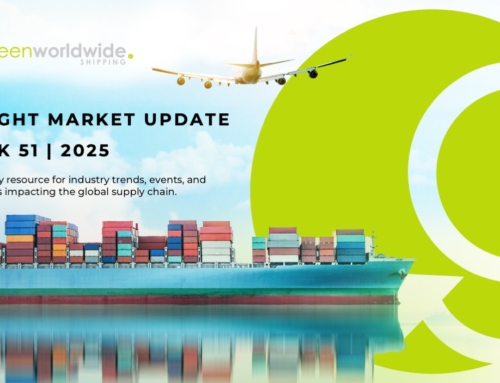INTERNATIONAL MARITIME ORGANIZATION REAFFIRMS COMMITMENT TO GHG EMISSIONS REDUCTION
At a recent press conference, the International Maritime Organization (IMO) announced its focus for advancing decarbonization efforts within the global maritime shipping industry in 2025. IMO Secretary-General Arsenio Dominguez reaffirmed the agency’s ongoing commitment to reducing greenhouse gas (GHG) emissions within maritime operations, stating, “We remain on track and continue to make progress.”
IMO STRATEGY ON REDUCTION OF GHG EMISSIONS
At the Marine Environment Protection Committee’s (MEPC) 80th meeting, IMO member states reviewed and adopted the 2023 IMO Strategy on Reduction of GHG Emissions from Ships.
The strategy, which aims for net-zero emissions by 2050, sets revised targets for international shipping, including increasing the use of zero- or near-zero-GHG technologies and fuels to at least 5%, ideally 10%, of global shipping’s energy consumption by 2030. It also strengthens energy efficiency requirements for ships, marking a key shift toward a greener maritime future.
2025 MID-TERM MEASURES AND UPCOMING VOTE
As part of the effort to meet ambitious GHG reduction goals, the IMO is preparing a set of mid-term measures that combine technical and economic strategies to drive reductions. These measures include stricter fuel standards, the introduction of pricing mechanisms such as carbon levies, and additional incentives to accelerate the adoption of low-carbon technologies. The vote on these proposals is scheduled for Spring 2025, and if approved, they will be adopted in Autumn 2025, with entry into force expected in 2027. The outcome will determine whether the IMO can move forward with mandatory measures designed to reduce GHG emissions, with the goal of establishing a clear pathway to achieving net-zero shipping by 2050.
IMPACT OF THE VOTE ON THE SHIPPING INDUSTRY AND SUPPLY CHAINS
If the mid-term measures are adopted, their implementation will have wide-reaching consequences for the shipping industry and global supply chains.
Impact on the Shipping Industry:
Increased Costs: Shipping companies will face higher costs due to new fuel standards and the need to invest in alternative fuels and technologies. The shift towards cleaner fuel sources could lead to increased operational costs in the short term.
Innovation in Technology: Shipping companies will need to embrace innovative technologies, including biofuels, hydrogen, and energy-efficient ship designs. These advancements will be essential for complying with the new regulations and achieving the IMO’s long-term decarbonization goals.
Economic Measures: The IMO is considering introducing a carbon levy or tax to address the cost differences between traditional fossil fuels and greener alternatives. Some shipowners have proposed carbon taxes as high as $150 to $300 per ton of CO2 emitted.
Impact on the Global Supply Chain:
Potential Disruptions: The introduction of these new measures could lead to temporary disruptions in shipping operations as the industry adapts. Ports and shipping companies will need time to implement the necessary infrastructure and technologies to meet the new regulations.
Cost Increases: As fuel costs rise due to the adoption of cleaner alternatives, the shipping industry’s operational costs are likely to increase. These costs may be passed on to consumers, raising the cost of goods in global markets.
Changes in Port Operations: Ports will need to invest in infrastructure upgrades, such as renewable energy sources and fueling stations for low-carbon fuels. These investments will help support the broader transition to a sustainable shipping sector, but they will require significant upfront capital.
NAVIGATING A SUSTAINABLE FUTURE FOR SHIPPING AND SUPPLY CHAINS
The IMO’s strategy envisions a net-zero global shipping sector by 2050, driving the transition to low-carbon and zero-carbon fuels, energy-efficient ships, and innovative propulsion systems. While the transition will require significant investment, it will present new opportunities for innovation, job creation in green sectors, and position the shipping industry as a leader in combating climate change.
THE STRATEGIC SHIFT TOWARD SUSTAINABLE FUELS IN SHIPPING
Shippers looking to enhance their sustainability efforts can partner with operators, like Green Worldwide Shipping®, that are pioneering the use of low-carbon and zero-emission fuels. This collaboration not only supports the industry’s decarbonization goals but also helps shippers align their own sustainability targets with greener shipping solutions. Many companies are investing in the necessary infrastructure, such as advanced shipbuilding technologies and retrofitting vessels for alternative fuels, to support this transition. Green has the sustainability infrastructure and assets in place today to support companies of any size in evaluating their current GHG emissions, provide directed mitigation solutions, offer access to zero-emissions trucking and maritime shipments.
Tools like GreenCheck®, which provides real-time data on transport emissions, further enable shippers to make informed decisions and track progress toward their zero-emissions targets. By leveraging such technology, shippers can identify opportunities to improve fuel efficiency and reduce emissions, ensuring their operations remain ahead of the curve in an increasingly competitive and environmentally conscious market.
Stay up-to-date on freight news with Green’s Weekly Freight Market Update by following us on LinkedIn. For continuous updates, make sure to check out our website at greenworldwide.com.
MAKE YOUR FREIGHT MATTER
When you choose Green Worldwide Shipping, you’re not just selecting a logistics partner—you’re also contributing to meaningful change. For every shipment, Green plants a tree, helping to support both farmers and the planet. Contact Green to learn how you can make an impact!
To learn more about Green’s sustainability efforts, visit https://www.greenworldwide.com/sustainability/.





